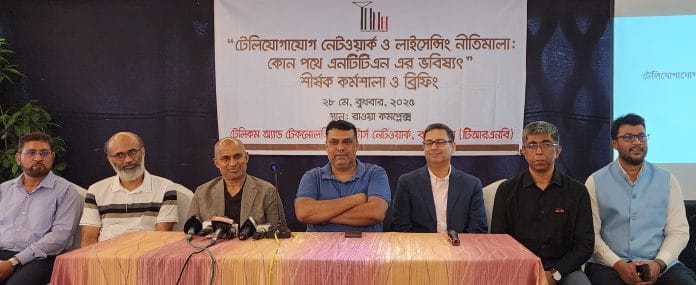The Bangladesh Telecommunication Regulatory Commission (BTRC) is allegedly favouring Mobile Network Operators (MNOs) in the country’s proposed telecom topology and licensing framework, according to stakeholders from the National Telecommunication Transmission Network (NTTN) sector.
The allegation came from the country’s largest NTTN firm, which has invested over $200 million over the past 16 years. The firm raised the issue at a workshop titled “Telecommunication Network and Licensing Policy: Which Way Does NTTN’s Future Go?” held at the Rawa Complex in the capital on May 28. The event was organised by the Telecom and Technology Reporters Network Bangladesh (TRNB).
Local entrepreneurs warned that if the proposed structure is implemented, it could severely damage domestic business interests and pose risks to national security.
Speakers at the event expressed grave concerns that the proposed policy would increase the dominance of foreign-owned mobile operators while undermining local internet infrastructure companies and reducing job opportunities for young entrepreneurs.
In a press briefing, several industry representatives highlighted what they described as inconsistencies in the new licensing and network-sharing policies.
Mainul Haque Siddiqui, Chairman of Fiber@Home, argued against the claim that existing infrastructure is not ready for advanced technologies such as 5G. “The current infrastructure is technology-ready. Although investment levels are relatively modest, there are no barriers to 5G deployment,” he said. He warned that the new licensing policy exerts undue pressure on ISPs under the guise of promoting competition, which could drive many small businesses out of the market.
He also alleged that the proposed framework disproportionately benefits MNOs, describing the policy as “irrationally biased.”
Telecom expert Sumon Ahmed Sabir described the proposed policy as “contradictory” and emphasized the strategic importance of the telecommunications sector. “This sector is not just a business—it is linked to national security. While foreign investment is necessary, domestic capabilities should not be overlooked in favour of exclusive opportunities for MNOs,” he said.
Sabir cautioned that opening all avenues to MNOs would disadvantage ISPs despite linguistic nuances in the policy.
Abbas Farooq, Chief Governance Affairs Officer of an NTTN organisation, noted that the country’s six NTTN operators collectively maintain over 150,000 kilometers of fiber optic cables. However, he said the new framework introduces significant disparities between public and private operators, and creates uncertainty in areas such as transmission equipment permissions and network sharing.
Lieutenant Colonel (Retd.) Rabiul Islam, Government Affairs Officer of the same organisation, criticised the policy for creating “an environment of control at every level,” which he claimed would disrupt market balance and threaten the survival of small business entrepreneurs. “BTRC is staging a drama to protect the interests of mobile operators,” he alleged.
Entrepreneurs at the workshop also voiced concern that if MNOs are allowed to function directly as ISPs, it would cause severe damage to the NTTN sector. They warned that increased reliance on international technology could jeopardize national security.
As a solution, they demanded a reassessment of the proposed policy, including external vetting by international telecom experts. The stakeholders stressed the need for a balanced, inclusive approach that protects both domestic and foreign interests, ensures fair competition, and strengthens the country’s technological sovereignty.

